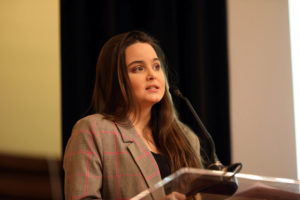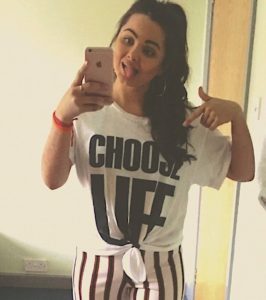Gentle ripples. One small conversation here, another there. Invitations to think about organ donation. One conversation leading to another. Small, expanding ripples, almost hiding the urgency, vitality, of their topic.
Every now and then, something bigger is dropped into the pool. Makes a splash. Pushes the ripples faster and further, into new places…
Like today’s press release, from Northern Ireland’s Public Health Agency.
“The Public Health Agency (PHA) is delighted to launch new primary school organ donation education resources aimed at introducing organ donation education at an early age. With the educational curriculum in mind, the resources will provide Key Stage1 and 2 pupils with the information they need to find out more about the topic and to discuss it with family and friends.” (Full press announcement here.)
It takes effort to make a splash like that. Like the passion and energy of Lucia, Live Loudly Donate Proudly’s founder, who had this goal in her sights in early 2015.
Lucia had been invited to join a small panel of judges for a schools’ poster competition on organ donation. As the day approached, she was deeply disappointed that she wouldn’t be able to participate. Lucia was back in hospital. Even more disappointed to learn that the competition had been cancelled due to a lack of entries. She knew why. Like Lucia, like most of us, until the matter of organ failure knocks on our door we are unlikely to pay it much attention. In the void, myths and misinformation can take root.
The clock was ticking as Lucia needed a third, life-saving transplant. There were no guarantees…
Determined to make a difference with the time she had, she blue-tacked pages onto the windows of her cubicle in the Children’s Hospital. Her day’s programme had an hour blocked out, off-limits to her medical team. “I’m working,” she said. And she was. Asking questions about what prevented children and young people from having the right information on organ donation, why such conversations might be hard for some, and how to make it different.
Lucia started planning her campaign in that cubicle. With help from some of her closest friends, Live Loudly Donate Proudly was launched from the depth of her illness. A week later Lucia received the call that would save her life a third time, plumbing new depths of gratitude to another donor family.
A few months later, Lucia addressed her local Borough Council, along with Alexia, mother of a young organ donor, and Mary, specialist nurse for organ donation. A Councillor spoke honestly of her difficulty talking with her teenage children about her wishes to be an organ donor, asking the panel for their wisdom.
There was no time for Lucia to answer then but, on her way home, her questions ripened in intense conversation. She compared the difficulty for those teenagers with the engagement and support she experienced with her peers. Lucia was eight years old when she needed her first transplant, and a second transplant before she was ten. Her friends and classmates went through the story with her. They saw her struggles, in and out of hospital, missing classes, sometimes weeks at a time. They saw her joy each time she returned to get on with life and live it fully. They saw her gratitude to the unknown donors who saved her life and gave them back their friend. Saw her commitment to making it possible for others to have the same chances she enjoyed.
Lucia spoke to school classes, to assemblies, took every opportunity she was offered to tell her story and make it useful for someone else. She knew how powerful it was when her peers had it straight. Conversations went home to siblings and parents. They spread. Names were added to the donor register. And as we would hear later, lives were saved.
Back in school, Lucia met with peers and teachers, with the goal to see organ donation education in the Northern Ireland curriculum. She presented her programme to the education minister, and was invited to address N Ireland’s Health and Social Care Trusts, Health Department representatives, health charities, youth groups and national youth conferences.

“It is essential that young people are educated regarding organ donation, the benefits and the facts of what it is and how it works,” Lucia said. “This initiative is not about forcing or coercing our young people into believing that organ donation is what they wish to do. It is about giving them the tools and the knowledge they need to make their own decision. To do this, they must be able to separate myths from facts, and be given a comprehensive understanding of the subject.”
“The Live Loudly Donate Proudly campaign is committed to creating the resources and implementing this on the school curriculum, so that every young person learns about organ donation in safe spaces, where people can feel comfortable to discuss uncomfortable issues…an ordinary conversation that leads to an extraordinary gift.”
Lucia’s fourth transplant brought complications too much for her body to manage. When the Live Loudly Donate Proudly team and the Principal and Vice-Principal from her secondary school met again with the Minister of Education and senior staff from the Department of Health, it was without Lucia, though not without an intense awareness of her energy and wisdom that led us to the moment.
This time, both Departments committed to taking it forward. The newly appointed organ donation promotions manager for the introduction of the opt-out system for N Ireland convened a working group, including Live Loudly Donate Proudly, developing imaginative lesson plans and resources for primary school children. Resources for piloting in secondary schools are almost complete.
Today these resources became available to every primary school in Northern Ireland. Cast into the pool and the ripples begin…
Enough? No. Just a beginning… Lucia wanted the information in schools not just to inform children and young people, but to equip them. From personal experience Lucia believed in the capacity of children and young people to be engines of change, to make a difference. The splash in the pool today is evidence of that. In Lucia’s words…
“Your voice can create change. Whether you’re talking about organ donation, mental health, gender equality or whatever you’re passionate about. What you say matters. We want to encourage young people to discover and use their voices to create change in their local community and all over the world. It is up to each one of us to create a society we are proud to be a part of. Not only for ourselves, but for the generations who will come after us. Use your voice…Live Loudly…”

